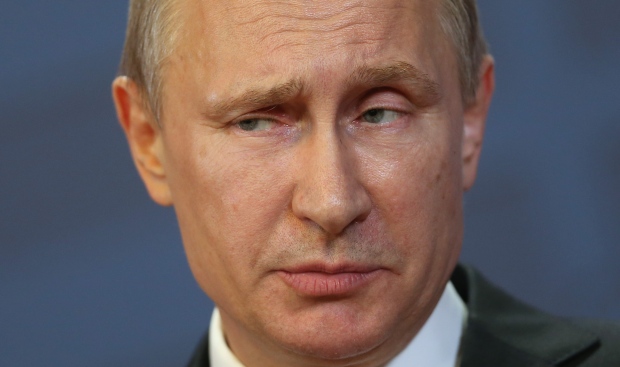Canadian Prime Minister Justin Trudeau is reshuffling his cabinet today, and the CBC reports that he will appoint Chrystia Freeland as Foreign Minister. Freeland was placed on a sanctions list by Russia in 2014. Canada, therefore, will now have a Foreign Minister who is prohibited from entering the Russian Federation. This must be a first in international politics.
Freeland did not end up on Russia’s sanctions list by accident. A former journalist, and author of a book entitled Sale of the Century: Russia’s Wild Ride from Communism to Capitalism, Freeland has been frequently critical of modern Russia. The positive heroes of Freeland’s musings on Russia are the 3 Ks of the so-called ‘liberal opposition’ – Kasyanov, Kasparov, and Khodorkovsky. But she views those who actually govern Russia, especially Vladimir Putin, in an extremely negative light. As for the Russian people, she once wrote: ‘Russians have no one to blame but themselves for the brutal dictatorship they built in their own country and imposed on their neighbours.’ Freeland says, ‘I think of myself as a Russophile. I speak the language and studied the nation’s literature and history in college. I loved living in Moscow in the mid-nineties.’ That may be true, but if so it’s a Russophilia of a particular kind.
To get a feel of her views, let’s take a look at what the new Canadian Foreign Minister has written and said about modern Russia.
Perhaps probably the clearest exposition of her attitude is an article entitled ‘What does Putin want?’, which appeared in Prospect magazine in January 2015. This is fairly typical of the ‘What Putin Wants’ genre which keeps appearing in the press, and which generally consists of unsubstantiated allegations about what’s going on in Putin’s head. In her article, Freeland says:
Putin’s macho posturing can be so crude and his double-speak so transparent that it is easy to lose sight of how effective the Kremlin’s foreign communication strategy has been. All the talk of a mystic Slavic brotherhood, of feelings of national humiliation, of responding to the threat posed by Nato and standing up for a multi-polar world has done its job.
It has also obscured what it is that Putin really wants. That is quite simple. He is a dictator whose thirst for power has eroded the economic prosperity his rule had hitherto partly rested upon. Foreign conquest is an obvious distraction and substitute.
Putin’s Russia has chosen its path. Today it is an authoritarian state, with expansionist ambitions, that does not consider itself bound by international treaties and norms. To secure his power at home, Putin has decided to test its limits abroad. Whether it is in Ukraine, or elsewhere, one day we will have to stop him.
According to another article penned by Freeland, the war in Ukraine is entirely the fault of Vladimir Putin, and can be explained solely in terms of ‘Russian aggression’. This aggression in turn derives from Putin’s determination to suppress opposition at home by any means. Freeland writes:
Mr. Putin has already muzzled Russia’s once boisterous free press, exiled and imprisoned opposition leaders and assumed direct control of the mass media. … This [the war in Ukraine] is not a civil war … this conflict started with the Ukrainian people’s revolt against authoritarianism and in favor of the liberal rights and responsibilities Ukrainians call European values. This is partly a fight of freedom of speech against censorship. Ukrainians decided to build a democracy at home and to make a trade deal with Europe; Russia invaded.
The war in Ukraine, says Freeland, ‘is a fight for democratic values, human rights, multicultural spheres.’ ‘It is an entirely good thing that Ukraine’s new leaders are defining their national identity as inherently democratic and freedom-loving’, she writes elsewhere. Putin, however, ‘need[s] … to show that a democratic Ukraine living under the rule of law can’t work’, Freeland claims. This explains the war in Donbass. ‘Russia wants to snuff out democracy’, she says.
Freeland is on record as demanding that Canada take a hard line against Russia. Before the Liberal Party took power in a general election in October 2015, she complained that the sanctions introduced against Russia by the then Conservative government did not go far enough. In January 2015, for instance, she declared that it was ‘mystifying’ that certain members of Putin’s ‘inner circle’ had not been sanctioned, and called for Russia to be expelled from the SWIFT international banking system.
Later, as Minister of International Trade, Freeland accepted the new government’s policy of engagement with Russia, but also made it clear that engagement didn’t so much mean dialogue as Canada lecturing Russians on their behaviour (‘talking to the Russians’, not talking with them). As she said:
Now, when it comes to Russia, our view is that the most effective way that we can support Ukraine, that we can support those democratic values, is by being part of that international community, which is engaging Russia and talking to the Russians about how they have to live up to their international commitments.
Justin Trudeau’s father, Pierre, went out of his way during his Premiership to foster good relations with the Soviet Union. Judging by Freeland’s appointment, Trudeau Jr doesn’t seem to be such a friend of the Russians. Either that or he didn’t think about the Russia-related implications of his decision, or he is just isn’t aware of Freeland’s politics. However you look at it, the apointment is not a good sign as far as Russo-Canadian relations are concerned.


























Laissez un commentaire Votre adresse courriel ne sera pas publiée.
Veuillez vous connecter afin de laisser un commentaire.
Aucun commentaire trouvé